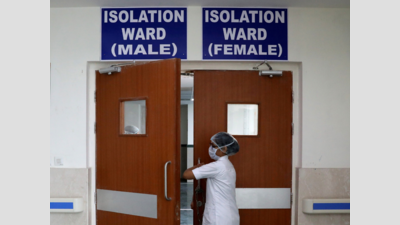- News
- City News
- mumbai News
- Covid-19: Recovery rate low at 19%, Maharashtra hopes relaxed discharge rules will rev it up
Trending
This story is from May 11, 2020
Covid-19: Recovery rate low at 19%, Maharashtra hopes relaxed discharge rules will rev it up
At 19%, the state’s recovery rate for coronavirus patients lags far behind the national average of 31%. It may finally see some improvement with the Centre’s new discharge policy kicking in from Sunday.

Reuters photo used for representational purpose only
MUMBAI: At 19%, the state’s recovery rate for coronavirus patients lags far behind the national average of 31%. It may finally see some improvement with the Centre’s new discharge policy kicking in from Sunday.
The union health ministry had eased the discharge rules (see box) on Saturday. Doctors welcomed the new rules, saying these would be a major help in freeing up beds sooner while saving resources spent on repeat testing.
The BMC had brought in the discharge policy at least a week before the Centre’s decision. It had also done away with the need for two negative reports to ease the burden on laboratories. The city’s recovery rate, though, has been hovering around 22%.
Doctors say that sometimes a patient needs up to seven tests before turning negative, even though there may not be serious clinical symptoms.
The hospital had done a study of 26 Covid-19 patients in which 13 had a severe illness and the rest had mild disease. In the 13 with severe illness, four had died while six had recovered and gone home. The average number of days to get negative results in the six patients with severe disease was 14 days as against 13 days in the nine recovered patients with mild disease. “It is reported that patients are usually culture negative beyond the first week despite persistent RNA positivity,” wrote Dr Tanu Singhal, one of the co-authors of the study.
“The Centre’s decision will benefit everyone. In our findings, we recommended discharging patients after they are symptom-free for optimal utilisation of resources,” she said on Sunday.
State officials, too, were hopeful that early discharge would push the recovery rate. “It’s not that our patients are being treated any differently than others in the rest of the country. However, there is an issue of time lag and sometimes discharges are not immediately updated in our systems,” said Dr Pradeep Awate, state surveillance officer.
At least 60% of the 17,500-odd people undergoing treatment in the state are asymptomatic and expected to recover early. The percentage of critical patients is around 2%, who may need prolonged hospitalisation, said state officials.
The union health ministry had eased the discharge rules (see box) on Saturday. Doctors welcomed the new rules, saying these would be a major help in freeing up beds sooner while saving resources spent on repeat testing.
The BMC had brought in the discharge policy at least a week before the Centre’s decision. It had also done away with the need for two negative reports to ease the burden on laboratories. The city’s recovery rate, though, has been hovering around 22%.
Doctors say that sometimes a patient needs up to seven tests before turning negative, even though there may not be serious clinical symptoms.
A study by doctors at Kokilaben Hospital in Andheri documented how the patients with severe disease, as well as those with mild disease, spent an additional 7 and 10 days, respectively, in the hospital to document swab negativity. The number of tests done to get two negative reports was anything between 2 and 11 for every patient.
The hospital had done a study of 26 Covid-19 patients in which 13 had a severe illness and the rest had mild disease. In the 13 with severe illness, four had died while six had recovered and gone home. The average number of days to get negative results in the six patients with severe disease was 14 days as against 13 days in the nine recovered patients with mild disease. “It is reported that patients are usually culture negative beyond the first week despite persistent RNA positivity,” wrote Dr Tanu Singhal, one of the co-authors of the study.
“The Centre’s decision will benefit everyone. In our findings, we recommended discharging patients after they are symptom-free for optimal utilisation of resources,” she said on Sunday.
State officials, too, were hopeful that early discharge would push the recovery rate. “It’s not that our patients are being treated any differently than others in the rest of the country. However, there is an issue of time lag and sometimes discharges are not immediately updated in our systems,” said Dr Pradeep Awate, state surveillance officer.
At least 60% of the 17,500-odd people undergoing treatment in the state are asymptomatic and expected to recover early. The percentage of critical patients is around 2%, who may need prolonged hospitalisation, said state officials.
End of Article
FOLLOW US ON SOCIAL MEDIA











